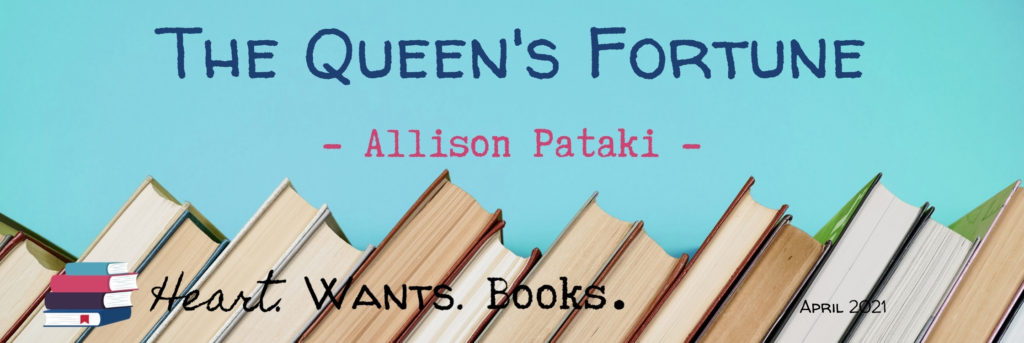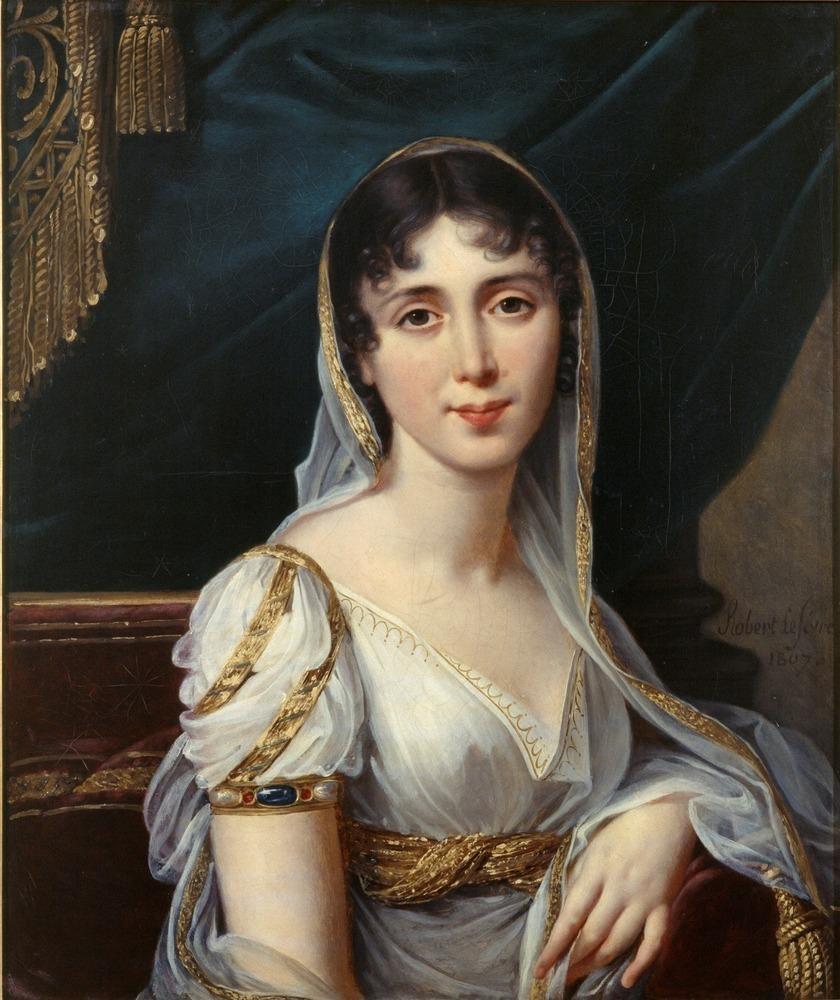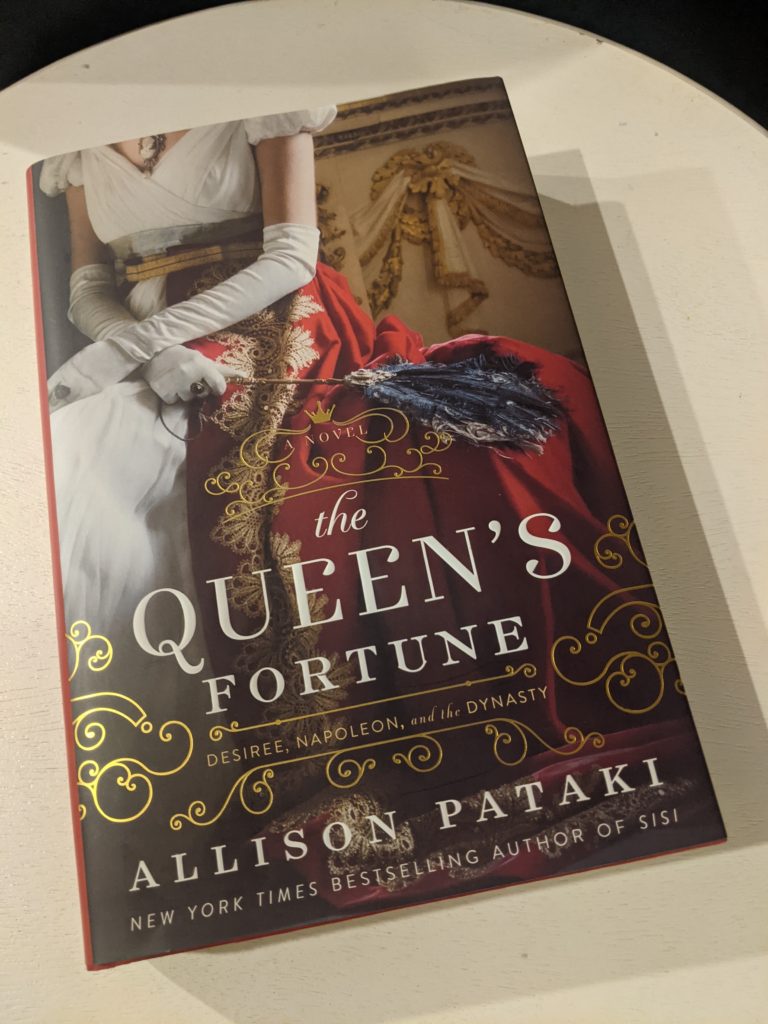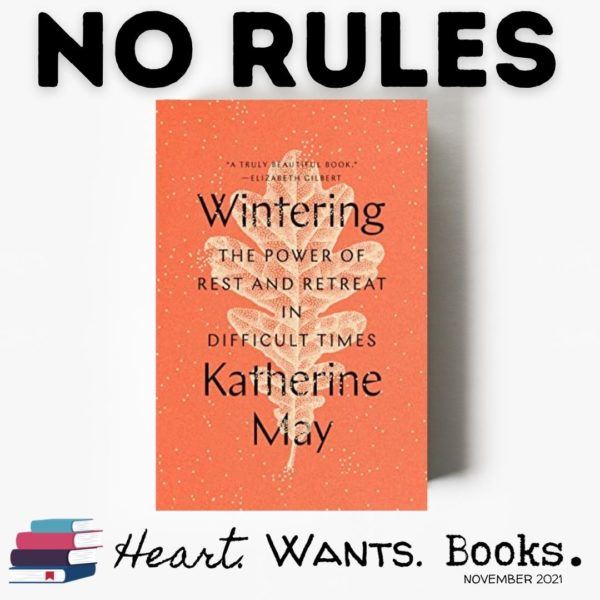The Queen’s Fortune by Allison Pataki April 15, 2021

The following post includes affiliate links. More details here. As you’re doing your Amazon shopping, we’d be ever so grateful if you’d use our affiliate link to do so as it helps pay the bills around here!

Neil Gaiman’s American Gods feels like a dramatic turn from today’s book on a young woman during the French revolution, but is it really? Napoleon may have acted like he was a god, but he wasn’t even the Sun King. He was beloved by the French people, and one might argue was the Revolution personified. I do wonder how different today’s tale is from one that includes “an epic war for the very soul of America” but time will tell, and quickly, as our next virtual book club is coming up on Friday, May 7 at 7:30 p.m. CST. Let us know if you’re planning to join in the conversation!
Let me begin at the beginning with when The Queen’s Fortune landed on my TBR list, and thus Ashley’s. Honestly, I don’t know, but it was most definitely the first time I heard it was coming. I have read and adored all of Allison Pataki’s books for adults, even if I didn’t appreciate the ending (I’m looking at you Sisi). Even her memoir, Beauty in the Broken Places was gorgeous, and I’d highly recommend it. Was it hard to get Ashley to read this with me? Nope. We both studied French, have traveled to Paris, and aspire to go again, so when I proposed a story of the revolution with an author whose writing and commitment to research was top notch, she was in!

Oh readers, one thing I love and hate about historical novels that are about real people is the self control it requires of me not to Google and ruin the ending (which Ashley will do below – you’ve been warned). When the prologue opens in Stockholm in 1880 and I know I’m reading a book that’s going to heavily be spending time with Napoleon, I’m confused. All is revealed by the ending, and I did not Google it (not even yet, but soon I will dive DEEP down that rabbit hole). I now want to know all the things about Desiree Clary and what her (actual) life was like, including all the things that lead her to Sweden. Pataki’s books land in my sweet spot- the untold story of the women ignored by the male writers of history. Just as Napoleon directed the participants to be included in Jacques-Louis David’s painting(s) of his coronation, these men who were the victors determined what stories we received and I am so grateful for researchers and writers who dig in to the information available and fill in the gaps, even if it is fictionalized.
As we are in these strange times of continuing pandemic, renewed fight for racial justice, and demands to return to “normal,” I found it cathartic to dig into this tale with sixteen-year-old Desiree and her 22-year-old sister Julie as they struggled to navigate life as bourgeoise women in Marseille during the Reign of Terror, and I was here for it when scrappy Napoleone di Buonaparte (his original, Corsican/Italian name) joins in the scene. The way Napoleon is described, from his humble beginnings to his struggles to hold onto power (if it’s history, it’s not a spoiler, right?!) finally made him into a dimensional character rather than only a power hungry monster. (Was he also a power hungry monster? Yes, but that wasn’t all.) But the best part was getting to know Desiree, and through her, Julie and Josephine.

While Napoleon’s rise and fall is chronicled in this text, the story is really about the women of his inner circle. Desiree is our narrator who leads us on this adventure, showing us the splendor and struggles of post-revolutionary France as it sought to find itself and rise from the bloody trenches. Desiree, Julie, and Josephine all seek to make the most of the circumstances in which they find themselves, courtesy of the men around them. Josephine transforms into what Napoleon needs her to be as that shifts and changes, doing everything in her power for the man she loves. Julie is the dutiful wife and sister supporting her husband in his support of his famous brother. And Desiree patiently waits until Napoleon is ready for her to play her part too and then she does. Her life isn’t easy, despite her privileged place in society, but she fares better than many, both during that time and of that status, and the ending was really hopeful and beautiful – and I want it to be true because I want to read the biographies that she helps to shape of herself and her husband. Maybe it is true, but just not in English, and my French is no longer up to the task. [Neither is Ashley’s.]
I give The Queen’s Fortune three and a half stars and will round up to four. The writing was gorgeous, the descriptions amazing, and I was sucked into the page. I wanted more in the last part of the book, more around Bernadotte’s political ideology adjusting to align with his acceptance of a crown, and more in the author’s notes about what is fact and what is fiction. I don’t know that I’ll reread it, but I’m very interested in reading more about Desiree and Bernadotte and maybe even watching Jean Simmons and Marlon Brando play them in Desiree, based on the book by Annemarie Selinko. I have read all of Pataki’s backlist, and I’m automatically interested in whatever project she’s working on next! If you’re interested in the ideas or time frame, check out Where the Light Falls for a less bourgeois perspective on the early years of the revolution.
~Nikki
Don’t sleep on the author’s notes. I think that’s the best advice we give here at Heart.Wants.Books. and The Queen’s Fortune by Allison Pataki proves this true. I loved learning that Pataki’s obsession with Désirée Clary Bernadotte began with a question posed by her father, “one of the greatest history geeks I know:
‘Allison, what do you know about Desiree Clary? Desiree Bernadotte? The Frenchwoman, Desiree?’… ‘Honestly? Nothing.’ ‘You should look into her. Her life – you cannot believe it’s true. But it is.’”

The fact that Pataki allowed her father to ‘should’ on her in such a manner speaks well for their understanding of each other as people, but that’s a discussion for another time. Pataki is the New York Times bestselling author of historical fiction The Traitor’s Wife, The Accidental Empress, Sisi, Where the Light Falls, and The Queen’s Fortune. She has co-written two children’s picture books with Marya Myers, Poppy Takes Paris and Nelly Takes New York, both illustrated by Kristi Valiant. Her memoir, Beauty in the Broken Places, captures her memories of before and feelings during and after her husband suffered a stroke at the age of 30 on the flight to their ‘babymoon.’ [Nikki here: It sounds depressing, but it’s actually uplifting.] Pataki left a journalist’s life in NYC because her novel writing after work and on weekends gave her more fulfillment than the stress of the 24-hour news cycle. She currently lives in New York with her husband and family.

Nikki had me recommending The Queen’s Fortune to the digital library before its publication in February of 2020 because it seemed inherently interesting. (Also, I won a dead-tree copy of the book from Goodreads which Nikki ended up reading and I read the digital copy from the library, because we’re clearing that holds list this month!) It’s the story of Désirée Clary, the former fiancée of Napoleon Bonaparte, whose elder sister marries Napoleon’s elder brother Joseph, is a sometime friend of Empress Josephine, and who ultimately becomes Queen of Sweden and Norway not because she marries the king, but because her French husband is elected to the kingship! Y’all, it’s history. It’s all on the Wikipedia and in the marketing copy, and I, unlike Nikki, deep-dived because, well, reasons and needs. Deep-rooted and habitual, a historian has needs which must quench my thirst for answers. Because Pataki’s writing left me needing answers. Let me extrapolate a moment.

Were Pataki’s characterizations of historical figures able to bring a humanity to them not found in nonfiction? So much yes. Her descriptions of the fashion, familial and political machinations, and geography that surrounded Désirée are like cream to a cat for me. Did I find myself repeatedly mapping Paris on my computer for reference as Désirée travelled the city? Hundop. Did I just get caught up in my Paris pictures from 2004 because I needed to find this exceptionally fuzzy photograph of me at Napoleon’s Tomb in The Dome at Musée de l’Armée to share with you? Also, yes. Was I annoyed Every. Stinking. Time. I was forced to read Desiree instead of Désirée? SO DANG MUCH! Even Wikipedia has the accent aigu over the Es because one of these words is not like the other and it MATTERS. Additionally, I felt that near the end of the book the timeline was considerably more rushed than at the beginning of Désirée’s life. The jump in years was significant between chapters and I would have loved to understand her life and place at court in Sweden in a more intimate way than just how she was the observer at big royal events. Who she became as Queen and Queen Mother after she left Paris for good is more of the story I want. Wikipedia actually helped fill in those holes for me.
Overall, I give The Queen’s Fortune a three star review. The writing was good, the historical research for Désirée’s life in France was superb, and it met expectations overall, but I really felt a lack at the end of the book even though the beginning really held up. She was losing me at the battle by battle narration after Napoleon became Emperor, and by then I just needed more of what pulled me in at the beginning: Désirée’s relationships.
~Ashley

PLEASE SUPPORT US WHEN YOU SHOP BY FIRST CLICKING ON THE IMAGES BELOW:








